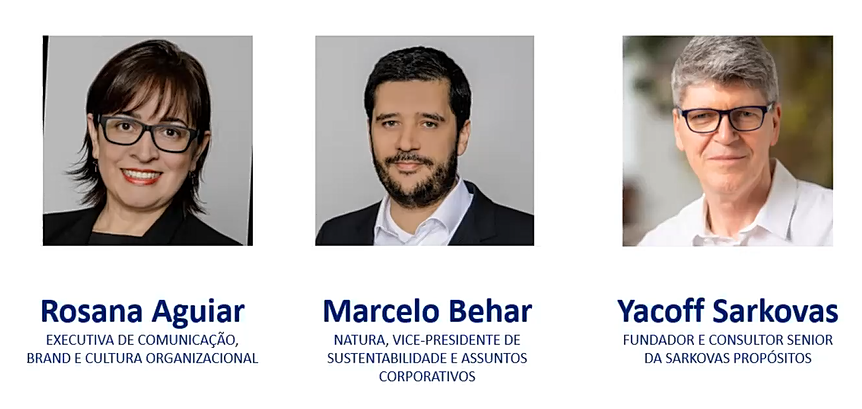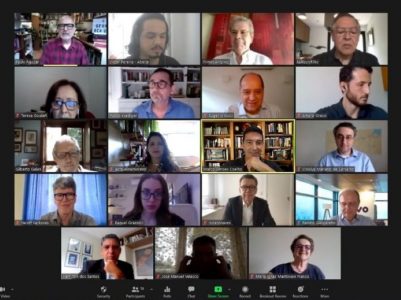Advisory Council discusses the role of business leaders in defense of democracy
ESG and networks are central points, according to advisers

At a meeting of the Aberje Advisory Council, held on March 31, Aberje CEO Paulo Nassar presented and welcomed the new advisory councilors: Rosana Aguiar, Executive of Communication, Brand and Organizational Culture; Marcelo Behar, VP of Sustainability and Corporate Affairs at Natura, and Yacoff Sarkovas, founder and senior consultant at Sarkovas Purposes. On occasion, there was a debate on “The role of business leaders in defense of democracy,” with the participation of Sarkovas and sociologist Marco Aurélio Ruediger, director of DAPP – Directorate of Analysis and Public Policies at FGV, an entity that feeds the blog Democracy & Communication on the Aberje portal.
For decades at the confluence of public and business interests, Sarkovas spoke about corporate responsibility for democracy. To contribute to the debate, the executive made a point of reading his new article on the topic. The text brings considerations about the reaction of business leaders to some relevant facts that occurred before, during, and after the last United States elections, such as the attack of protesters on the American capitol in early 2020, making a correlation between them and democracy.
On occasion, Sarkovas claims to see the defense of democracy as an axis transversal to the ESG concept. “I think this participation is delicate. It has to be done with great propriety and care, as it cannot be confused with ideological proselytism or partisan engagement,” he said. On the other hand, the executive believes that there is a massive space for organizations to defend the democratic rule of law. “We will see; fortunately, it’s increasingly entering the corporate agenda due to pressure from civil society and, mainly, in a country like Brazil, with a democracy that is in its infancy. If the US, a reference country for Western democracy, is currently under an attack on its democracy, what can happen Brazil with its history?” he said.
By bringing some reflections on the role of leadership in preserving democracy, sociologist Marco Aurélio Ruediger quoted the historian Niall Ferguson, who in his book “The Square and the Tower” rescues the reasons why, historically, networks were critical in the construction of societies and the world. “The author makes a longitudinal observation, from the Middle Ages, going through Renaissance movements until today, in which networked systems replace more hierarchical systems.”
When analyzing the research “What to expect from organizational communication in Brazil,” conducted by Aberje, one data, in particular, caught the attention of the sociologist. “We are moving towards a society that increasingly demands that the professional, especially the communication one, understands this new circumstance, this compression of time and the circulation of information through the networks. This means that it is necessary to invest in differentiated training for the communication professional,” said Ruediger.
Another point highlighted by the professor is that companies have space for new and modern guidelines such as the green economy and smart cities, in the sense of speeches that are also active in terms of a broad and generous policy with the society around values. “A networked society means that everyone is involved and knowing how to translate their position into narratives seems absolutely central to preserving what we have achieved, which is democracy. Today, democracy in Brazil is at risk, and the communication professional is important to leverage your company, your brand, but associated with important values so that we have a modern and contemporary society,” he said.
COMENTÁRIOS:
Destaques
- Sports as an instrument of Change
- Aberje Launches Newsletter with Economic Panorama
- Charting a Path to Responsible Communication: WPRF 2023 Wraps Up in Chennai, India
- Global Alliance AGM elects new Board 2023
- Aberje discloses its positions on the Fake News Bill (PL 2630/2020)
ARTIGOS E COLUNAS
Marcos Santos Maratona da vidaMônica Brissac Thought Leadership: marca pessoal x reputação corporativaLetícia Tavares Liderança comunicadora: um tema sempre atualHamilton dos Santos Comunicação é estratégica na economia contemporâneaCarlos Parente Um salto ornamental para mergulhar no pires




























